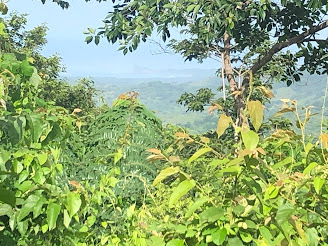The
government of Costa Rica is wisely worried about the continued shutdown of the
country and its borders due to the Coronavirus. The closure of land borders
with Nicaragua and Panama and the two international airports in San Jose and
Liberia have resulted in a massive loss of jobs and revenue in the tourist
industry from which Costa Rica derives about 9% of its revenue.
The current strategy
of the government, referred to as "Hammer and Dance" has been to gradually open the country to inner border travel.
To gradually open the country up they
are allowing (even encouraging) tourist traffic by local citizens and expats
within its borders. When we heard this, we didn’t have to be told twice. After months of quarantine we quickly planned a
getaway to the Nicoya Peninsula about one-hundred-fifty miles north of our home in
Puriscal.
 |
| Finca Continga Azul |
Our destination was the Finca Continga Azul (https://www.fincacotinga.com/die-villa) and
the Nosara Beach Hotel (https://www.nosarabeachhotel.com/)
. We had stayed with Michael and Irena’s wonderful finca, (farm and ranch) on a previous
trip. Midway between Nicoya and Samara Beach near the tiny village of Cuesta
Grande, the finca occupies 150 acres of beautiful, undeveloped land which Michael and
Irena have crafted three beautifully made casitas, complete with an infinity pool and everything
necessary to set up house for a weekend, a week, or month.
The main house accommodates the outdoor dining area where we were
served a hearty breakfast of locally prepared Gallo Pinto, chorizo sausage, fruits
from the farm, and breads from local bakers. The ranch has a stable with five horses
and miles of hiking through fields of orange trees, coffee plants, and howler
monkeys. Unusual and interesting sites along with ocean and
mountain vistas are around every corner.
 |
| Finca Continga Azul |
Michael and Irena relocated to Costa Rica a few years ago
from Germany. They developed the finca for guests and offer building lots for
sale for building your own casita in paradise. We enjoyed catching up with our hosts and hearing about and sharing stories of
grandchildren, children, and of course of the impact the Coronavirus has had on
their enterprise.
After two days at the finca we drove thirty kilometers to Nosara. What a trip! To say that it was a challenge is certainly an understatement. From Cuesta Grande
to Samara is fifteen kilometers of scenic beauty on good roads through the Nicoya
countryside. Then the excitement begins.
On a perfect sunny day we drove
through absolutely the worst roads we have been on in Costa Rica—potholes large
enough to swallow our car, filled with muddy water which concealed the craters within. At times we were forced to drive ninety degrees laterally to avoid complete
washouts in the roadway ahead of us. Since there is only one way into Nosara there was more
traffic than we expected. Certainly not a lot, but cars and trucks of all makes
and ages, delivery vans, flatbed trucks and trailers; everything imaginable.
Most drove reasonably slowly as you would expect given the conditions,
but some flew past us at twice our speed.
Several times we said to each other that we would go home by
another way—but the only other way was through a mountain crossing that
involved impassable rivers and creeks that our car would not handle.
 |
Lunch on the beach at La Luna
|
After a thirty mile, two-hour cruise, our first stop in Nosara was La Luna restaurant located on Playa Pelada. We were served a lovely lunch of margaritas (surprise), ceviche, and pizza served on the beach. When a light rain shower started we retreated to the porch where we finished before driving a few meters to the most unusual hotel we had ever seen.
Its website says it all . . . “The Nosara
Beach Hotel is the most recognizable landmark perched on a naturally exquisite
point between the world-class beaches of Playa Guiones and Playa Pelada on the
Pacific Ocean since 1977. Part of the local history as the very first hotel in
Nosara, now restored to its original grandiose with whimsical architectural
lines and eclectic flavors.”
Local tourists were just
venturing out from the Coronavirus lockdown and few had found their way to
Nosara. We were among a very few guests. In the morning we were early beachcombers
along both Playas Guiones and Pelada. What a splendid morning it was with gentle,
warm waves and a couple dozen guests spread along ten or fifteen kilometers of
beautiful pristine beach.
 |
Playa Pelada
|
After our morning stroll we had café
and a traditional Tico breakfast (Gallo Pinto, chorizo sausage, huevos, fruits
and bread with preserves.) It was a perfect morning and
a perfect ending to a perfect getaway.
One thing you must remember is
that travel by car in Costa Rica always takes longer than you would expect because
you are never driving as fast as you think. Sometimes it’s because of road
conditions, other times it’s because of traffic, but mostly it’s because you
are never driving more than 80 kilometers per hour or about 50 MPH.
On the
mountain roads you can expect speeds of no more than 30 MPH. Google maps listed our trip from Pusical to
Nosara as 160 miles with travel time of 5 ½ hours.
It was close.
 |
Playa Guinoes
|































